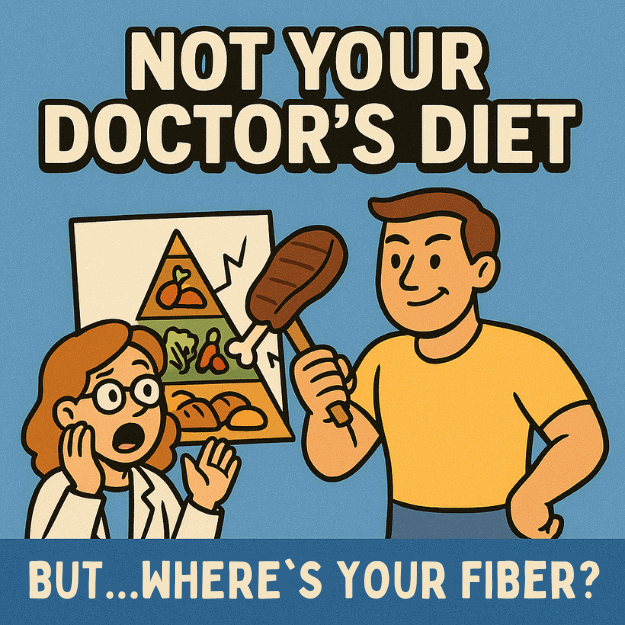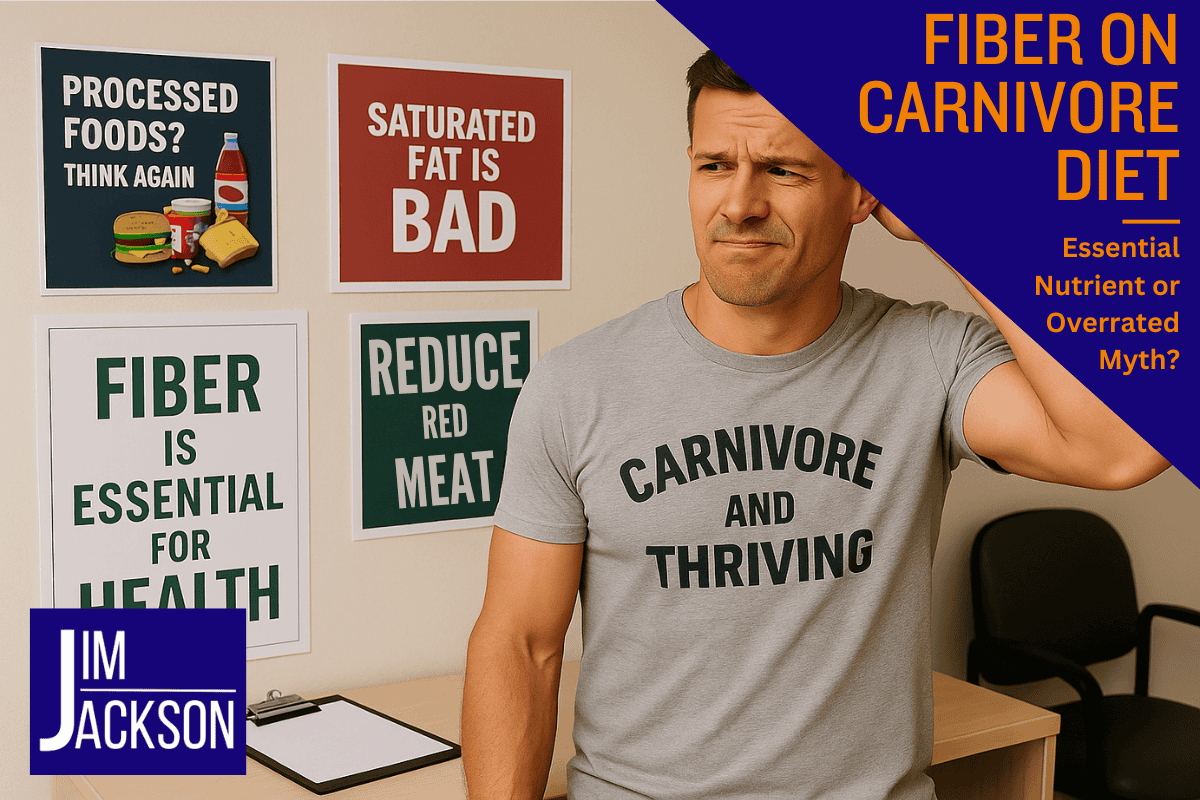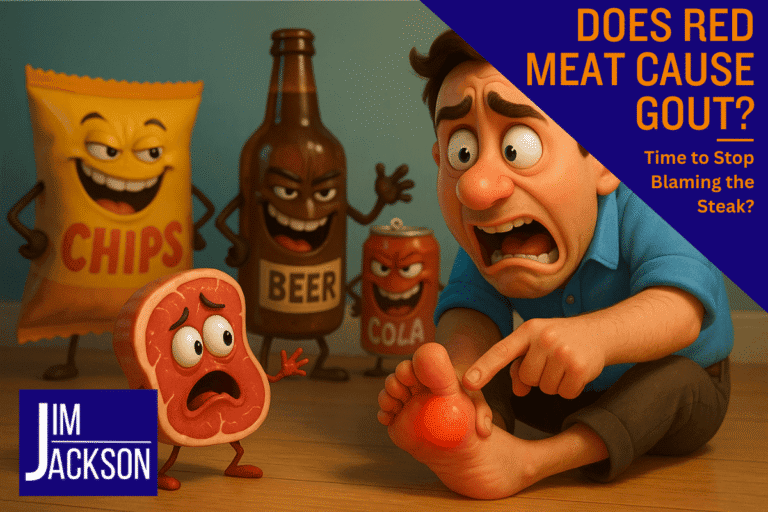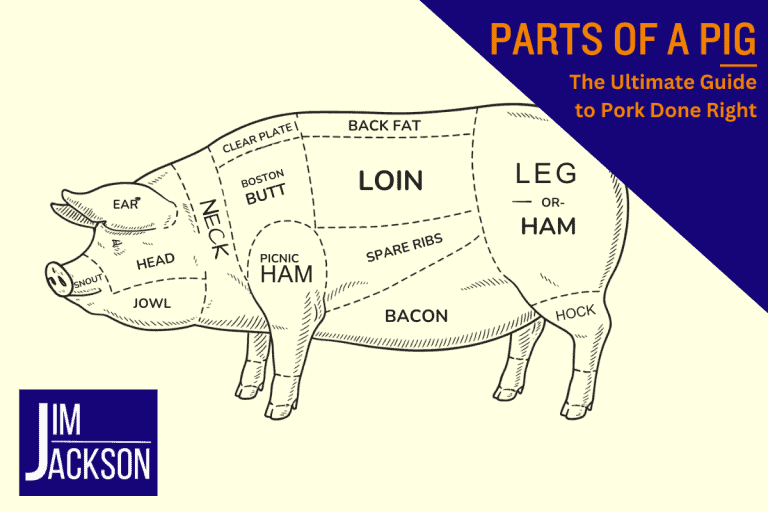Fiber On A Carnivore Diet: Essential Nutrient or Overrated Myth?
“Eat more fiber!”
You’ve heard it from your mum, your GP, and the side of your cereal box. Apparently, if you don’t, your digestive system will grind to a halt and you’ll be backed up like the I-95 on a Friday afternoon.
But here’s the twist: What if cutting fiber actually led to smoother bowel movements? What if ditching the grains and greens could improve digestion, clear skin, and boost energy?
That’s exactly what people on the carnivore diet are experiencing. No plants. No grains. No fiber-rich foods. Just meat, fat, salt—and often, zero fiber. And many are thriving.
So if there is no fiber on a carnivore diet, it raises important questions…
Is Fiber Really Essential? Are there any health benefits to dietary fiber?
This post explores the origins of the fiber obsession, whether it is subject to scrutiny, and how those on low-carbohydrate diets, like carnivore and keto, are changing the script.
We’ll also explore what our ancestors actually ate (spoiler: it probably wasn’t psyllium husk), and whether a meat-only diet can support your health without plant-based “essentials.”
Let’s start with the official line we’ve been fed for decades…
TL;DR: Fiber on a Carnivore Diet
✅ The carnivore diet excludes all fiber-rich foods, yet many report better digestive health, stable blood sugar, and improved regular bowel movements.
✅ A zero fiber diet doesn’t mean constipation. Fat, salt, bone broth, and animal products support the digestive system naturally.
✅ Ancestral diets lacked plant-based foods and fiber, yet people thrived without fiber supplements or modern gut hacks.
✅ If fiber were essential, a meat-only diet wouldn’t work—but thousands of carnivore dieters are proving otherwise.
Why Fiber Is Considered Essential

Fiber has long been sold as the golden ticket to digestive health. The idea? It bulks out your stool, feeds your gut bugs, and keeps things moving. And there are two types to know:
➡️ Soluble fiber – dissolves in water and may help with blood sugar control and lowering cholesterol
➡️ Insoluble fiber – adds roughage and helps stimulate intestinal activity
Both types are found in plant-based foods—things like fruit, vegetables, legumes, and whole grains. These fiber-rich foods make up a large portion of a typical diet that’s considered “healthy.”
Claimed Benefits
Eating a diet rich in fiber is linked to:
✅ Lower risk of colon cancer
✅ Improved cardiovascular health
✅ Better mental health via gut-brain connection
✅ Easier weight management
✅ Healthier levels of blood sugar
Many people turn to fiber supplements (like psyllium husk)and fermented foods for beneficial bacteria and improved gut health.
On paper, it sounds convincing. But many feel worse when they up their fiber intake—more bloated, more gassy, sometimes even more constipated.
Meanwhile, those on carnivore diets, with zero fiber, are often reporting the exact opposite.
So… if fiber’s essential, how come these people feel better without it?
That’s what we’ll explore next.
What Happens When You Eat Zero Fiber?

People who switch to a meat-centric diet often describe:
✅ Less bloating and digestive discomfort
✅ Fewer issues with irritable bowel syndrome
✅ More regular bowel movements
✅ Improved gut health without gas, cramps, or the need to hover near a toilet
You’d think the complete removal of fiber-rich foods would cause chaos in the digestive system, but for many, it’s quite the opposite.
Some even say their digestion has never been better. No leafy greens. No chia seeds. No fiber supplements… just meat, salt, bone broth, and animal fats.
How Does That Even Work?
The body adapts. When you remove fiber, your gut doesn’t shut down—it just adjusts how it operates.
Here’s what’s going on:
➤ Your stomach acid increases, making the digestion of animal-based foods more efficient
➤ Your bile and enzymes take over the job of breaking down fat and protein
➤ There’s less waste and less bulk, so stools are smaller, but still consistent
➤ Without fiber fermenting in your gut, there’s less gas and bloating (I can vouch for this 😀)
Some carnivore dieters even describe bowel movements as “quick, clean, and easy”—without needing fiber to push things through.
It’s almost as if the body were designed to run without plants (notice the sarcasm?).
Isn’t That Unhealthy, Though?
That’s the million-dollar question.
Eliminating plant-based foods goes against everything we’ve been taught about a balanced diet, but that doesn’t mean it’s wrong.
Emerging evidence suggests that a lack of fiber isn’t the health threat we thought it was, especially when you’re fueling yourself with high-quality animal products, including organ meats, fat, and protein.
We’ll break down that evidence and the cultural assumptions around fiber next.
Digestive Health Without Fiber

The idea that you need fiber for good digestion is drilled into us from every direction. Doctors recommend it. Guidelines promote it. And you’ll find it plastered on every cereal box in the supermarket.
But what if it’s not essential after all?
Gut Health, Rewired
On a carnivore diet, digestion looks different—but that doesn’t mean it’s broken. In fact, many report improved digestive health once they drop the fiber and the plant foods that caused irritation in the first place.
Here’s why it might work:
✅ There’s less fermentable material in the gut (so less gas and bloating)
✅ Animal products are highly bioavailable—easy to absorb, with minimal waste
✅ You’re not constantly stressing the gut with complex plant compounds
In short, your body gets what it needs, uses it efficiently, and gets rid of what it doesn’t—without the need for insoluble fiber to “scrub” your colon clean.
So What Keeps Things Moving?
Everyone asks, “But if I don’t eat fiber, won’t I get constipated?”
Not necessarily.
People on the traditional carnivore diet report that their digestion feels smoother and more predictable over time. There is no bloating, straining, or endless wiping – and this was my experience.
Some helpful factors include:
➤ A high protein, high-fat intake that encourages bile production and lubricates the system
➤ Natural bone broth rich in gelatin and minerals to soothe the gut lining
➤ A reduction in gut irritants often found in plant-based and processed foods
And let’s not forget—many who suffer with digestive disorders like irritable bowel syndrome find relief once fiber is out of the equation.
But… Isn’t Fiber Supposed to Feed Good Bacteria?
Yes, that’s the mainstream claim. Fiber feeds your gut bugs, which produce short-chain fatty acids like butyrate that support the gut lining.
But if those bacteria only thrive when fed fiber-rich foods, and you feel better without them… what does that say?
Some researchers argue that beneficial bacteria can adapt to a low-fiber diet and that the gut ecosystem may look different, but not necessarily worse, on a carnivore diet.
Your body isn’t broken for not needing fiber. It may simply be operating the way it was designed to—efficiently, without excess.
Can a Meat-Only Diet Support Long-Term Health?

This is the bit that makes people squirm.
“Sure, you might feel good now,” they say, “but isn’t this dangerous in the long run?”
Let’s tackle that head-on—because if a zero fiber diet works in the short term but wrecks you over time, that’s a problem. But is that what we’re actually seeing?
Meat = Nutrient Dense (If You Do It Right)
When most people think of eating only meat, they imagine someone chewing through ribeye after ribeye with no variety. That’s not the full picture.
A well-constructed carnivore diet includes:
✅ High-quality animal products
✅ Nose-to-tail eating with plenty of organ meats
✅ Natural fats for energy and nutrient absorption
✅ Salt, bone broth, and sometimes eggs or dairy
Together, this covers:
➤ Essential nutrients like zinc, iron, B12, and B vitamins
➤ Fat-soluble vitamins A, D, E, and K
➤ Protein for muscle, recovery, and immune health
➤ Electrolytes for hydration and energy
Even without plant-based nutrients, there’s no evidence of widespread nutritional deficiencies in people who are carnivoring properly. In fact, many report improvements in energy, mood, skin, and strength.
What About Heart Disease and Cholesterol?
The concern around saturated fat and red meat still hangs over the conversation. But again, it’s not black and white.
➤ Recent studies on low-carbohydrate diets show no increase in heart disease risk when carbs are reduced and quality animal fat is increased
➤ Many carnivore dieters see improvements in blood pressure, triglycerides, and blood sugar control
➤ It’s often the mix of fat and carbohydrate intake, not fat alone, that causes metabolic issues
And unlike processed meats full of additives and seed oils, whole cuts of fresh meat, organs, and fat aren’t the villains they’ve been made out to be.
Long-Term Observations
There are people who’ve followed a meat-centric diet for 5, 10, even 20 years with no sign of scurvy, heart attacks, or digestive collapse.
They’re not just surviving—they’re thriving.
And they’re not living on multivitamins and magnesium supplements, either. Their nutrient intake is coming from real food.
It’s not a magic cure. But it’s not a guaranteed health crisis, either.
Is the Carnivore Diet Safe?

Let’s be honest—when someone hears you’re on a carnivore diet, the first question is rarely “How do you feel?”
It’s usually, “Is that even safe?”
It’s a fair question. After all, it goes against everything we’ve been told about a balanced diet, food groups, and fiber’s supposed role in cardiovascular health and digestion.
So let’s unpack it properly.
Not All Meat Is Equal
People often lump steak in with spam and assume all meat is the same. But there’s a world of difference between eating:
✅ Grass-fed beef, liver, eggs, and bone broth. Or…
❌ Ultra-processed hot dogs and deli meats packed with additives
Most concerns around heart disease, high cholesterol, and even colon cancer are based on diets heavy in processed meats… not real, whole, animal-based foods.
This isn’t about eating too much meat—it’s about eating the right kinds.
Markers That Matter
Many people on a carnivore diet have seen:
✅ Reduced inflammation
✅ Better blood pressure control
✅ Improved mental health and emotional stability
✅ Stable blood sugar without crashes or cravings
In short, many of the things we’re told fiber, plants, and pills are supposed to do… are happening without them.
And that leads us to the big-picture question that might be the most important one yet.
Common Sense Check: Did Our Ancestors Eat Fiber?

Time for a little logic.
If fiber is essential for the human body to function properly, how did our ancestors survive without snack bars, flaxseed, or a $20 tub of psyllium husk?
It’s a simple question that mainstream advice rarely answers.
Ancestral Diets Weren’t Exactly Plant-Based
Humans evolved over millions of years, eating what was available: animals, fish, fat, organs, and seasonal food when it grew. Plant-based foods were nowhere to be found for large parts of the year, especially in colder climates.
That means no kale. No quinoa. No fiber supplements.
And yet… here we are.
Cultures like the Inuit and Maasai have traditionally consumed low-fiber diets, surviving almost entirely on animal products such as meat, blood, milk, and fat. And these weren’t just survival diets—they thrived. Strong bones. Fertility. No heart clinics in sight.
Now compare that to the modern world, where we eat more fiber-rich foods, more whole grains, more “healthy carbs”—and yet, chronic illness is everywhere.
Something doesn’t add up.
What If Fiber Were a Modern Fix for a Modern Problem?
It’s worth asking whether the need for fiber only became a thing once we started eating food that required it. Think:
➤ Ultra-processed carbs
➤ Sugar-filled breakfasts
➤ Low-fat, high-fiber Frankenfoods
If your diet consistently irritates your gut, you may need fiber to help sweep it out. But what if you just… stop irritating it?
That’s the idea behind carnivore. Don’t fix the problem with more inputs—remove the thing causing the issue in the first place.
If you can do that without missing any essential nutrients, do you really need fiber at all?
If you’re not convinced, please watch the following, where Dr Zoe Harcombe (who I’m a big fan of) explains with a little science and logic how fiber is not essential for health…
Conclusion: Do You Really Need Fiber on a Carnivore Diet?
Let’s rewind.
We’ve been told for years that fiber is essential. It supports digestive health, prevents heart disease, helps with weight loss, and keeps your bowels in working order. But here’s what the carnivore diet has shown us:
✅ You can have regular bowel movements without fiber
✅ A zero fiber diet doesn’t mean you’ll be constipated
✅ You can improve blood sugar, reduce inflammation, and feel sharper by eating just animal products
✅ Our ancestors didn’t survive on plant-based nutrients, and they didn’t take fiber supplements either
Look, I’m not a doctor, scientist, or anyone with the credentials to say that fiber is not essential. But I like to think I, like you, we’re blessed with basic common sense.
When I think about what food was available to our ancestors before we had shops, Uber Eats, and Maccy D’s, and especially before bread was invented, I don’t think there was much fiber in their diets.
What was available is what humans have been eating for a long time, up until then… and thrived. So, this is probably the fuel that our body wants, right?
Did that mean we only ate meat like the carnivore diet? Probably not.
But I think meat featured heavily, and it would have been close to what we now call the animal-based diet, or what I call the Ultimate Human diet.
Does this mean we’ve been brainwashed into believing fiber is essential? Well, I’ll let you decide.
I just want you to question these things and test them for yourself.
If you cut fiber and feel better for it, enjoy. If not, add it back in. (I suggest giving it a go for more than a few days—the body may need a little time to adjust.)
And that’s it… have a nutritious day!
FAQs
How do you get fiber on the carnivore diet?
You don’t. The carnivore diet avoids fiber-rich foods entirely. Instead, digestion is supported by animal products, bone broth, and fat, often leading to better, regular bowel movements without fiber.
How do you help digestion on the carnivore diet?
Focus on high-fat intake, bone broth, organ meats, and salt. These naturally support the digestive system, reducing the need for fiber supplements or plant-based foods.
What does Joe Rogan eat on the carnivore diet?
Joe Rogan follows a meat-centric diet, including wild game, steak, elk, and organ meats. He avoids plant foods, reports weight loss, and claims improved mental health and energy.
Do you need fiber if you don’t eat carbs?
No. Many on low-carbohydrate diets thrive without fiber. With zero carbohydrate intake, digestion often improves, and fiber intake becomes unnecessary, especially with quality animal products and adequate fat.







